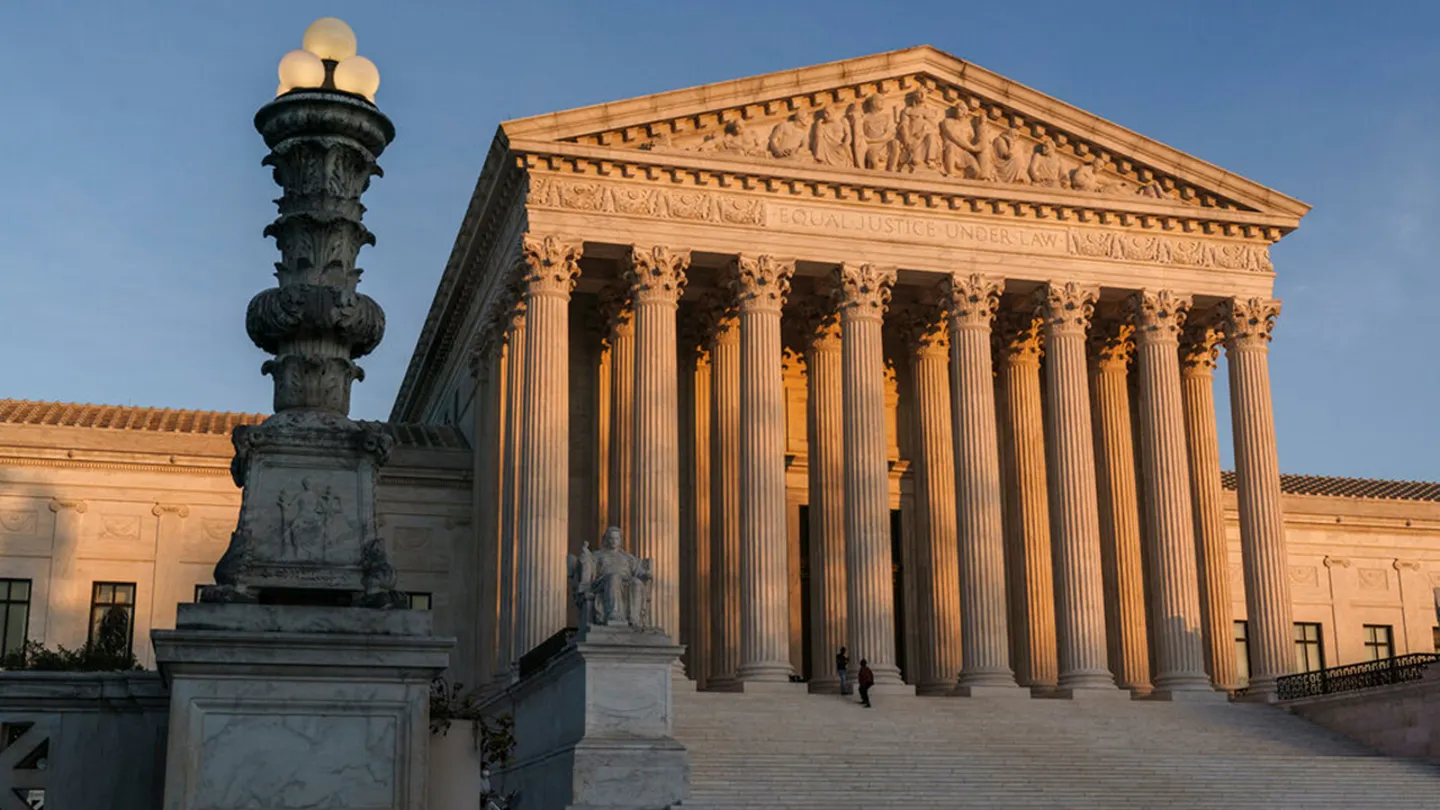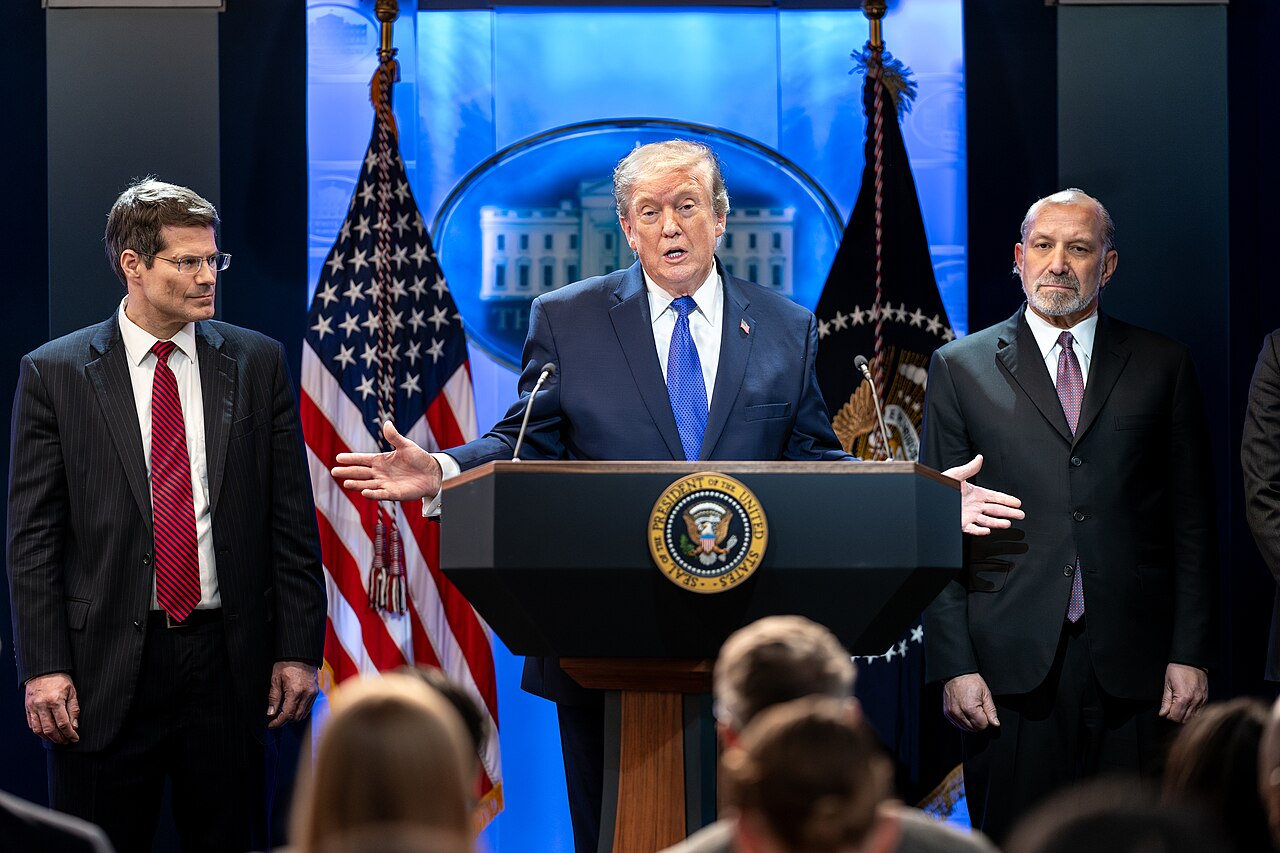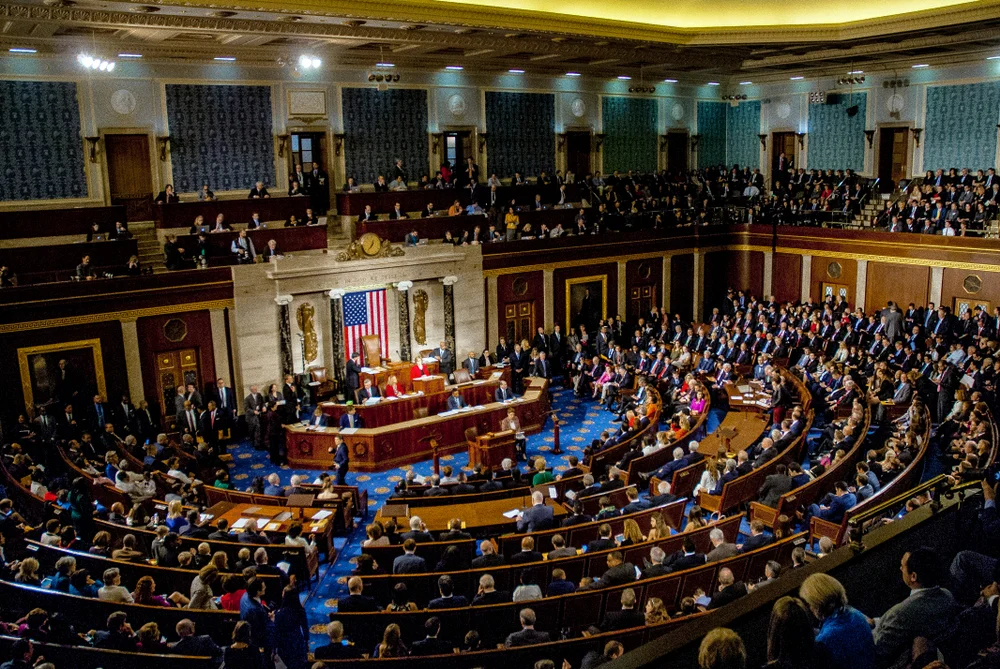
The Court of International Trade Issued a Deeply Flawed Tariff Ruling
The Court of International Trade’s decision in V.O.S. Selections Inc. v. United States improperly intrudes into national security affairs and fails to grapple with the profound constitutional issues at stake.
Opponents of the administration’s unprecedented trade war celebrated last week’s decision by the U.S. Court of International Trade (CIT). The CIT held that President Donald J. Trump could not use the International Emergency Economic Powers Act to set worldwide tariffs, retaliatory tariffs, or impose specific rates on imports from Mexico, Canada, or China to address drug trafficking, crime, and terrorism.
“The Worldwide and Retaliatory Tariff Orders exceed any authority granted to the President by IEEPA,” the Court announced. “The Trafficking Tariffs fail because they do not deal with the threats set forth in those orders.”
But critics may want to pause uncorking the champagne (no doubt bought before Trump’s initial 10 percent worldwide tariff, which then increased to 50 percent, then was temporarily suspended). A careful reading of the CIT’s decision in V.O.S. Selections Inc. v. United States reveals a flawed decision that improperly intrudes into national security affairs and fails to grapple with the profound constitutional issues at stake.
I share the view of critics that the trade deficit does not amount to an actual national emergency and that tariffs make no economic sense. In the interests of full disclosure, I serve on the board of the Pacific Legal Foundation, which is representing small businesses in the delightfully named case of Princess Awesome & Stonemaier Games v. Customs – in a separate suit against the Trump tariffs. But if the federal appeals court upholds VOS on the grounds given by the CIT, the decision will do more harm to the separation of powers and our constitutional system than it will be worth. A federal court could still block Trump’s trade war, but not for the reasons given in VOS.
On his first day in office, President Trump declared a series of national emergencies. He declared that international drug cartels were harming the United States with drugs, violence, and gangs; he declared a second national emergency at the southern border caused by cartels, criminal gangs, terrorists, human traffickers, smugglers, and illegal aliens; and that Canada, and later, China, had failed to stop the supply chain, money launderers, and international criminal involved with sending synthetic opioids to the United States.
President Trump soon issued an executive order expanding the national emergency beyond the fentanyl crisis and the southern border. On April 2, he declared that “underlying conditions, including a lack of reciprocity in our bilateral trade relationships, disparate tariff rates and non-tariff barriers, and U.S. trading partners’ economic policies that suppress domestic wages and consumption, as indicated by large and persistent annual U.S. goods trade deficits” posed a threat to U.S. national security and the economy. Trump effectively declared a national emergency due to Americans’ penchant for buying more from abroad than they sell abroad.
Without these emergencies, the President cannot wage his trade war. In normal times, the President has no constitutional authority to set tariffs; Article I, Section 8 gives only to Congress the power to “regulate Commerce with foreign Nations.” But in the 1977 IEEPA law, Congress delegated to the President broad international economic powers in time of emergency. IEEPA authorizes the President “to deal with any unusual and extraordinary threat, which has its source in whole or substantial part outside the United States, to the national security, foreign policy, or economy of the United States, if the President declares a national emergency with respect to such threat.”
Once the President identifies this foreign threat, IEEPA grants him a broad swath of economic power. He “may, under such regulations as he may prescribe, by means of instructions, licenses, or otherwise— … regulate, direct and compel, nullify, void, prevent or prohibit, any acquisition, holding, withholding, use, transfer, withdrawal, transportation, importation or exportation of, or dealing in, or exercising any right, power, or privilege with respect to, or transactions involving, any property in which any foreign country or a national thereof has any interest by any person, or with respect to any property, subject to the jurisdiction of the United States.”
Presidents have long used IEEPA to impose economic sanctions and even outright embargoes against America’s enemies and rivals. As of January 2024, there were 69 national emergencies declared by Presidents; more than 30 are still ongoing, with the oldest stemming from the Iran hostage crisis of 1979. IEEPA’s broad language says that the President can “regulate,” “prevent,” or “prohibit” the “importation or exportation” of property or transactions belonging to a foreign nation or national. IEEPA allows tariffs in function, if not in form.
Under his IEEPA declarations of national emergency, the Trump administration issued two types of tariffs. The first, which the Court labels “Trafficking Tariffs,” applies to China, Canada, and Mexico for failing to stop trafficking in fentanyl and other synthetic opioids by drug cartels. Those tariffs are currently 25 percent for Canada and Mexico and 20 percent for China. The CIT calls the second and third types “Worldwide and Retaliatory” – President Trump memorably announced these country by country from a low of 11 percent to a high of 50 percent.
The CIT struck both tariffs down on remarkable, indeed unprecedented, grounds that range far from the judiciary’s proper role in foreign affairs. The three judges could have agreed to reject the tariffs on the straightforward ground that the trade deficit does not qualify as “an unusual and extraordinary threat” to the national security, foreign policy, or economy of the United States, as required by IEEPA. The trade deficit has been a persistent feature of the economy since the early 1970s. Indeed, as the Court acknowledges, President Richard Nixon imposed temporary across-the-board tariffs more than 50 years ago to try to reduce the trade deficit. Nor has the trade deficit suddenly become worse. While in nominal dollar terms the balance of trade runs almost $900 billion a year, in 2022, as a percentage of gross national product, it was roughly the same as it was during the middle of George W. Bush’s presidency. An economic phenomenon that has been ongoing for more than half a century is not a national emergency.
The CIT judges, who rarely, if ever, address important constitutional issues, understandably wanted to avoid overruling a national emergency. But to avoid that choice, it made a series of decisions that distort the fabric of the law governing national security and foreign affairs. First, they found the worldwide tariffs illegal because Congress did not delegate the power to impose tariffs in IEEPA. The Court, however, could not square this rejection with IEEPA’s plain text. Recall that it allows the President to “regulate” or even “prohibit” the “importation or exportation” of property owned by a foreigner.
To skirt IEEPA’s broad scope, the Court gestured to broader canons of construction, including the nondelegation and major questions doctrines. The major questions doctrine counsels courts against interpreting vague laws to vest power over questions of “vast economic and political significance.” Under this doctrine, the Supreme Court blocked President Biden’s imposition of a nationwide Covid vaccine mandate under a vague public health statute and his waiver of student debt through the guise of a law helping veterans deployed abroad. Justice Scalia wonderfully expressed an early version of the doctrine as the idea that Congress “does not usually hide elephants in mouseholes.”
The problem for the CIT, however, is that the major questions doctrine should not apply to the Trump tariffs. Major questions orders courts to stop the executive branch from seizing broad economic, political, or social powers by reading vague statutes too broadly. But IEEPA is no vague statute. Congress directly addresses international emergencies in IEEPA and intentionally vested the President with broad economic powers to meet them. It is true, as the CIT pointed out, that Congress enacted IEEPA to narrow the even broader powers that Presidents enjoyed under the Trading with the Enemy Act of 1917. Under TWEA, Presidents had created wartime boards of trade that controlled all imports and exports. Presidents not only imposed embargoes on North Korea and Cuba, but also – in a blatant abuse of a statute meant to apply to foreign threats – declared a bank holiday, a moratorium on mortgage payments, and a departure from the gold standard.
But in passing IEEPA, Congress accepted the breadth of delegation to the President to control trade. IEEPA borrows directly from the 1917 law the language granting the President the authority to “regulate” or “prohibit” any transaction involving the “importation” of property owned by foreigners. Instead, Congress limited TWEA to wartime and then enacted IEEPA to grant similar powers to the President in peacetime. Congress constrained Presidents not by narrowing the scope of their powers, but by creating a new process for finding and declaring a national emergency before accessing those powers. Congress did not display any intent to prevent Presidents from imposing duties or taxes on imports under the IEEPA's power of regulation or prohibition. Indeed, just two years before the passage of IEEPA, a federal appeals court had just upheld President Nixon’s use of the TWEA to impose universal, though temporary, duties on imports – i.e., tariffs.
If the CIT responds, Congress had wanted to grant the President the power to impose tariffs, it would have included the word “tariffs.” Congress, after all, has used the word “tariff” specifically in other parts of the U.S. Code. But that argument runs directly contrary to the only major Supreme Court case interpreting IEEPA, Dames & Moore v. Regan (1981), the existence of which the CIT surprisingly shows no knowledge.
In Dames & Moore, the President declared a national emergency in response to the Iranian hostage crisis and froze Iranian assets in the U.S. As part of the deal releasing our embassy personnel in Tehran, the President then unfroze those assets, lifted any court judgments against them brought by US creditors, and then transferred the assets to a tribunal in the Hague (where judges even to this day are divvying them up between American and Iranian claimants). IEEPA, however, did not delegate to presidents the power to nullify court judgments. Nevertheless, the Supreme Court unanimously interpreted the law to implicitly do so. “Congress cannot anticipate and legislate with regard to every possible action the President may find it necessary to take” during an emergency, then-Justice Rehnquist wrote. “Enactment of legislation closely related to the question of the President’s authority in a particular case which evinces legislative intent to accord the President broad discretion may be considered to ‘invite measures on independent presidential responsibility.’”
In other words, IEEPA had given the President a long laundry list of sweeping powers to handle an international emergency. If one isn’t on the list, courts can reasonably infer that Congress would have included it too if it had thought of it. This, of course, is not the approach that the Court takes in the major questions doctrine, but it is the one that the Justices have regularly applied to foreign affairs. As I have written in this space, the major questions doctrine itself advances the broader principles underlying the nondelegation doctrine, which prohibits Congress from delegating legislative power to the executive branch absent “an intelligible principle.” In VOS, the CIT suggests that it must read IEEPA to exclude tariffs because otherwise the law would violate the non-delegation doctrine for granting the President a power – tariff setting – that it cannot constitutionally delegate. “This court does not read the words ‘regulate . . . importation’ in IEEPA as authorizing the President to impose whatever tariff rates he deems desirable. Indeed, such a reading would create an unconstitutional delegation of power.”
Here again, the Court misunderstands the different constitutional frameworks that govern foreign versus domestic affairs. And like Dames & Moore, it fails to acknowledge the major Supreme Court precedent on point: United States v. Curtiss-Wright Export Corp. (1936). The non-delegation doctrine, according to Curtiss-Wright, does not apply to foreign affairs, and so, consequently, neither would the major questions doctrine. At the time of Curtiss-Wright, the Supreme Court had blocked several of FDR’s New Deal laws for granting excessive legislative power to the executive branch – the very birth of the non-delegation doctrine. But, as the Curtiss-Wright Court explained, “the powers of the federal government with respect of foreign or external affairs and those in respect of domestic or internal affairs [are] different.”
In domestic affairs, the Court observed, the federal government can only exercise those powers “specifically enumerated in the Constitution.” But in foreign affairs, Curtiss-Wright held, Congress’s legislative power can be combined with “the very delicate, plenary and exclusive power of the President as the sole organ of the federal government in the field of international relations.” As a result, the Court held, the non-delegation doctrine did not apply to foreign affairs. “If embarrassment . . . is to be avoided and success for our aims achieved,” Justice Sutherland observed for the Court, “congressional legislation [must] often accord to the President a degree of discretion and freedom from statutory restrictions which would not be admissible were domestic affairs alone involved.”
The Supreme Court has never disavowed Curtiss-Wright. Nor has it ever struck down a congressional delegation of foreign affairs power to the President. Indeed, Curtiss-Wright makes eminent sense. In domestic affairs, problems usually do not suddenly arise that inflict great harm on the nation. Congress and the President have the time and resources to develop policies, and, in the meantime, states, armed with their police powers, can serve as the first line of defense. In foreign affairs, however, problems can assume a dimension of time and magnitude that may require an immediate response. In a sudden attack, for example, the nation could suffer significant harm from an enemy. Even more long-standing problems may require a level of secrecy, speed, and decisiveness (to borrow from Alexander Hamilton’s description of the presidency in Federalist 70) to protect the nation. Congress’s ability to anticipate future circumstances will be far more limited in foreign affairs than in domestic affairs. And finally, states have no significant role in foreign affairs; they cannot attack these challenges while the federal government deliberates.
The CIT’s failure to address whether the non-delegation doctrine even applies to foreign affairs is a glaring mistake that could easily open the way for Trump to prevail on appeal. The CIT’s second holding compounds this failure: its rejection of the narrow “Trafficking Tariffs.” Regardless of whether one believes Congress did not intend to delegate to the President the power to set worldwide tariffs in IEEPA, it seems indisputable that Congress wanted to give the executive the power to target individual countries with economic sanctions. In fact, IEEPA grandfathered in embargoes on countries that existed at the time of its passage. If IEEPA allows a complete economic embargo of Cuba, for example, it should also permit a less aggressive use of that same power, such as a tariff on trade with Cuba.
In this respect, the CIT held that the trafficking tariffs failed because they “do not ‘deal with’ their stated objectives.” IEEPA grants the President broad powers, the three judges argued, so that he can “deal with” – Congress’s words – the national security emergency. The CIT held that tariffs do not have a direct link to the failure of China, Mexico, and Canada to stop drug trafficking into the United States. At best, they only create leverage for the United States to negotiate. If the President can use IEEPA “to permit any infliction of a burden on a counterparty to exact concessions,” the court reasoned, “then everything is permitted.”
VOS intrudes into foreign policy in a manner no federal court has ever done before. It claims the federal courts' ability to judge for themselves whether a chosen foreign policy effectively achieves its goals. Courts do not have access to information or the competence to make such difficult judgments. In Curtiss-Wright, the Supreme Court emphasized the executive branch's authority to make such foreign policy decisions. The President “has the better opportunity of knowing the conditions which prevail in foreign countries, and especially is this true in time of war. He has his confidential sources of information. [Secrecy] in respect of information gathered by them may be highly necessary.” But under VOS, federal courts are now to sit in judgment over whether the President has chosen the most effective means to achieve its goals. Trade sanctions on Cuba of various sorts have existed since the 1959 Cuban Revolution; nevertheless, the United States has failed to dislodge the regime of Fidel Castro and his successors from power. Will the CIT next strike down US trade sanctions on Cuba because they have failed to “deal with” the regime in Havana? Or will it invalidate economic sanctions on Iran because they have failed to stop Tehran’s march toward nuclear weapons? These questions demonstrate how seriously VOS extends the federal courts into foreign affairs areas where they are not competent.
The shortcomings of VOS’s second holding point the way for Trump to salvage his tariff regime. Courts will prove reluctant to approve worldwide tariffs, which depend on a dubious finding of a national emergency caused by trade deficits. But economic sanctions aimed at specific countries, based on specific findings of their threat to U.S. national security and foreign policy, would fit far more comfortably within IEEPA’s framework and past practice. Just as past Presidents have found the challenges posed by Russia, Iran, Cuba, and North Korea to justify trade embargoes, President Trump could center tariffs on China and any nations that cooperate with it. The rise of China’s cheap-labor intensive economy has helped produce the massive trade deficits and harmed U.S. manufacturing. But China represents an even greater threat to U.S. national security, not only because of opioid trafficking, but because of its military buildup and its antagonistic, covert campaign against U.S. interests. The weakness of VOS’s second holding suggests that the courts would uphold properly drafted tariffs targeted at China.
The CIT’s decision initially gave Trump’s critics reason to celebrate the end of his trade war. But closer scrutiny shows VOS to be a decision ripe for reversal. It could have addressed the question of national emergency directly, but instead, it so distorted central constitutional principles governing the conduct of foreign affairs and national security that higher appeals courts will likely have to intervene. While this will allow Trump’s trade war to continue, it could produce a better result if it persuades the President to replace his world-wide tariffs with sanctions explicitly targeted at China and its allies.
John Yoo is a senior research fellow at the Civitas Institute, and a distinguished visiting professor at the School of Civic Leadership, University of Texas at Austin. He is also the Emanuel Heller Professor of Law at the University of California at Berkeley and a nonresident senior fellow at the American Enterprise Institute. He serves on the board of the Pacific Legal Foundation, which is leading a lawsuit against the Trump tariffs.
Constitutionalism

Amicus Brief: Hon. William P. Barr and Hon. Michael B. Mukasey in Support of Petitioners
Former AGs Barr and Mukasey Cite Civitas in a SCOTUS Brief

Rational Judicial Review: Constitutions as Power-sharing Agreements, Secession, and the Problem of Dred Scott
Judicial review and originalism serve as valuable commitment mechanisms to enforce future compliance with a political bargain.

State Courts Can’t Run Foreign Policy
Suncor is also a golden opportunity for the justices to stop local officials from interfering with an industry critical to foreign and national-security policy.

Supreme Court tariff ruling should end complaints that justices favor Trump
John Yoo writes on the Supreme Court’s decision on President Trump’s tariff case.

Trump’s Tariff Tantrum
Trump leaps from the frying pan into the fire in the aftermath of Learning Resources v. Trump.

The Administrative State’s Sludge
Congress has delegated so much power across so many statutes that it’s hard to find a question of any public importance to which some agency cannot point to policymaking authority.


.avif)










.webp)


